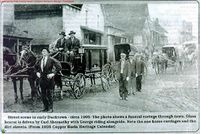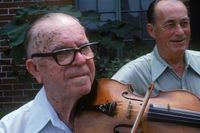Annotation:Muddy Road to Duck Town: Difference between revisions
No edit summary |
m (Text replacement - "garamond, serif" to "sans-serif") |
||
| (3 intermediate revisions by one other user not shown) | |||
| Line 1: | Line 1: | ||
=='''Back to [[{{BASEPAGENAME}}]]'''== | =='''Back to [[{{BASEPAGENAME}}]]'''== | ||
---- | ---- | ||
<p><font face=" | <p><font face="sans-serif" size="4"> | ||
'''MUDDY ROAD TO DUCK TOWN.''' AKA - "Muddy Road to Ducktown." AKA and see "[[Muddy Road to Moberly]]." Old-Time, Breakdown. A Major. Standard tuning (fiddle). ABC. Popularized by Alabama fiddler James Bryan, who learned it from the playing of elderly fiddler Robert McKinley 'Bob' Douglas (Chattanooga, Tenn., born 1900, who lived to age 101). Douglas was born in College Station, Bledsoe County, in the Cumberland Mountains, but grew up in the Sequatchie Valley. His father was an excellent fiddler as well, and, in 1928 when he could no longer play, gave his old German fiddle to Bob, who also played it all his life (it is now housed in the Museum of Appalachia, near Clinton, Tenn.). Douglas told Bryan that he had learned it when he was a young man from another fiddler, who himself was elderly at the time. In a newspaper interview ['''The Herald-News''', Rhea County, 7/8/2010] "Bob said that during the war [World War II], soldiers were building a road from Georgia to Ducktown. He said the road was awfully muddy. One Saturday night, Bob played a tune at a dance held for the soldiers so he decided to name the tune 'Muddy Road to Ducktown'." | '''MUDDY ROAD TO DUCK TOWN.''' AKA - "Muddy Road to Ducktown." AKA and see "[[Muddy Road to Moberly]]." Old-Time, Breakdown. A Major. Standard tuning (fiddle). ABC. Popularized by Alabama fiddler James Bryan, who learned it from the playing of elderly fiddler Robert McKinley 'Uncle Bob' Douglas (Chattanooga, Tenn., born 1900, who lived to age 101). Douglas was born in College Station, Bledsoe County, in the Cumberland Mountains, but grew up in the Sequatchie Valley. His father was an excellent fiddler as well, and, in 1928 when he could no longer play, gave his old German fiddle to Bob, who also played it all his life (it is now housed in the Museum of Appalachia, near Clinton, Tenn.). Douglas told Bryan that he had learned it when he was a young man from another fiddler, who himself was elderly at the time. In a newspaper interview ['''The Herald-News''', Rhea County, 7/8/2010] "Bob said that during the war [World War II], soldiers were building a road from Georgia to Ducktown. He said the road was awfully muddy. One Saturday night, Bob played a tune at a dance held for the soldiers so he decided to name the tune 'Muddy Road to Ducktown'." | ||
[[File:ducktown1.jpg|200px|thumb|right|A funeral in Ducktown, c. 1905.]] | |||
<br> | |||
<br> | |||
Ducktown is a small town in the Appalachians in the southeast corner of Tennessee, near the intersection of Tennessee, Georgia, and North Carolina. According to tradition, Ducktown was named after a Cherokee leader named Chief Duck (the tribe called their village ''Kawana'', which translates as 'duck town'). | |||
<br> | <br> | ||
<br> | <br> | ||
</font></p> | </font></p> | ||
<p><font face=" | <p><font face="sans-serif" size="4"> | ||
[[File:bobdouglas.jpg|200px|thumb|left|Bob Douglas]] | |||
''Source for notated version'': Bob Douglas (Chattanooga, Tenn.) [Silberberg]. | ''Source for notated version'': Bob Douglas (Chattanooga, Tenn.) [Silberberg]. | ||
<br> | <br> | ||
<br> | <br> | ||
</font></p> | </font></p> | ||
<p><font face=" | <p><font face="sans-serif" size="4"> | ||
''Printed sources'': Silberberg ('''Tunes I Learned at Tractor Tavern'''), 2002; p. 102. | ''Printed sources'': Silberberg ('''Tunes I Learned at Tractor Tavern'''), 2002; p. 102. | ||
<br> | <br> | ||
<br> | <br> | ||
</font></p> | </font></p> | ||
<p><font face=" | <p><font face="sans-serif" size="4"> | ||
''Recorded sources'': <font color=teal>Ducktown Station - "Tennessee Twister" (2006).</font> | ''Recorded sources'': <font color=teal>Ducktown Station - "Tennessee Twister" (2006).</font> | ||
<br> | <br> | ||
<br> | <br> | ||
</font></p> | </font></p> | ||
<p><font face=" | <p><font face="sans-serif" size="4"> | ||
See also listing at:<br> | See also listing at:<br> | ||
Hear James Bryan, Tom Jackson, and Carl Jones play the tune in 2002 at the Digital Library of Appalachia [http://dla.acaweb.org/cdm/singleitem/collection/Warren/id/2877/rec/2]<br> | Hear James Bryan, Tom Jackson, and Carl Jones play the tune in 2002 at the Digital Library of Appalachia [http://dla.acaweb.org/cdm/singleitem/collection/Warren/id/2877/rec/2]<br> | ||
Latest revision as of 14:27, 6 May 2019
Back to Muddy Road to Duck Town
MUDDY ROAD TO DUCK TOWN. AKA - "Muddy Road to Ducktown." AKA and see "Muddy Road to Moberly." Old-Time, Breakdown. A Major. Standard tuning (fiddle). ABC. Popularized by Alabama fiddler James Bryan, who learned it from the playing of elderly fiddler Robert McKinley 'Uncle Bob' Douglas (Chattanooga, Tenn., born 1900, who lived to age 101). Douglas was born in College Station, Bledsoe County, in the Cumberland Mountains, but grew up in the Sequatchie Valley. His father was an excellent fiddler as well, and, in 1928 when he could no longer play, gave his old German fiddle to Bob, who also played it all his life (it is now housed in the Museum of Appalachia, near Clinton, Tenn.). Douglas told Bryan that he had learned it when he was a young man from another fiddler, who himself was elderly at the time. In a newspaper interview [The Herald-News, Rhea County, 7/8/2010] "Bob said that during the war [World War II], soldiers were building a road from Georgia to Ducktown. He said the road was awfully muddy. One Saturday night, Bob played a tune at a dance held for the soldiers so he decided to name the tune 'Muddy Road to Ducktown'."

Ducktown is a small town in the Appalachians in the southeast corner of Tennessee, near the intersection of Tennessee, Georgia, and North Carolina. According to tradition, Ducktown was named after a Cherokee leader named Chief Duck (the tribe called their village Kawana, which translates as 'duck town').

Source for notated version: Bob Douglas (Chattanooga, Tenn.) [Silberberg].
Printed sources: Silberberg (Tunes I Learned at Tractor Tavern), 2002; p. 102.
Recorded sources: Ducktown Station - "Tennessee Twister" (2006).
See also listing at:
Hear James Bryan, Tom Jackson, and Carl Jones play the tune in 2002 at the Digital Library of Appalachia [1]
